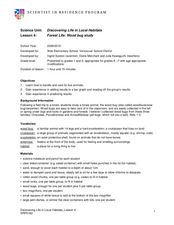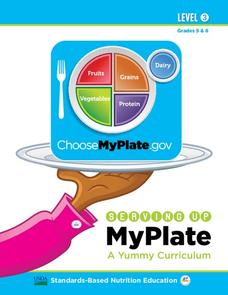Curated OER
Forest Life- Wood Bug Study
Examine wood bugs and their habitat. Learners gather wood bugs and examine their bodies. Then discuss their body parts and how they help them survive. They also predict where they think wood bugs live to then graph the class results.
Curated OER
Insects and Bugs
Learners recognize the difference between insects and bugs while making connections to personal experiences. In this insect and bug lesson, students complete a pre-assessment to demonstrate prior knowledge, then gather information...
Curated OER
Plankton in the Air
Here is a lab activity adequate for use with any full lesson on environmental factors that shape animal adaptations or marine animal characteristics. Pupils will discuss the role plankton plays in the environment and filter-feeding...
Curated OER
Chilean Sea Bass
Introduce your mini-marine biologists to using databases. Tables of how many Chilean Sea Bass were caught and number of hours spent fishing are examined. Using the data, individuals calculate the "Catch per Unit of Effort" for each year....
US Department of Agriculture
Serving Up My Plate
Within three nutrition-themed, inquiry-based learning opportunities, pupils take notice of their eating habits; delve deep into the five food groups, gain experience in planning meals, participate in a taste test, and explore ads from...
Kenan Fellows
Letter Writing to Politicians on Environmental Issues
Let your voices be heard! Pupils research local and national environmental concerns using the Internet. Class members determine an issue they deem important and draft a letter to a local politician expressing their concern about the...
NOAA
Individual Species in the Deep Sea
A tube worm's outer covering is made of chitin, the same material that makes up the shells of lobsters and crabs. Scholars create tube worms and analyze and discuss the longevity of organisms living near cold seeps. They then discuss and...
NOAA
Build Your Own Ocean Ecosystem
Hold the sea in the palm of your hand! Amateur oceanographers work together to create models of an ocean ecosystem in the sixth and final installment in a series. Raise awareness of global ocean health issues through guided research,...
Roald Dahl
Matilda - The Weekly Test
Readers take the main characters in Matilda and individually describe them through a mnemonic. To get there, group members create an acrostic poem describing the character they were given, and choose one of the words from the acrostic...
American Museum of Natural History
What's This? Feeding
Some species have pretty creative methods for catching food. Young scientists learn about some interesting ways organisms get the nutrients they need by navigating an online interactive lesson that would be suitable for a remote learning...
American Museum of Natural History
Rubber Blubber Gloves
Using gloves, shortening, tape, and a lot of ice, participants experience the feeling of having blubber. The experiment's eight steps follow an informative page about blubber and animals that have it.
Curated OER
Home Sweet Home
Students explore marine turtle habitats. Students research one species of marine turtle found in the Gulf of Mexico. They identify plants and animals in the habitat. They create a model or replica using information gathered through their...
Curated OER
Animals A to Z: Flamingo
In this editing sentences worksheet, students read and edit six sentences about flamingos to find ten errors in capitalization, punctuation, spelling and/or grammar. Students correct each error.
Curated OER
Aquatic Safari
Learners use an Internet Web site to locate the scientific information about various marine species. They use the Internet to find the scientific information about marine animals.
Curated OER
Invertebrate Phyla
Students explore the invertebrate phyla. They discuss the characteristics of the invertebrate Phyla in the Kingdom Animal. Students classify organisms into Phyla based on their characteristics. They distinguish radial symmetry, bilateral...
Curated OER
Science: Fossil of a Carbonized Plant
Pupils classify leaves by shape and margins and use them to create models of plant fossils. By using paper over a leaf, they simulate fossilization of organisms onto sedimentary rocks. Following instructions on worksheets, students...
Curated OER
Vocab-u-lous! Build a Fabulous Vocab
In this vocabulary worksheet, students select the best choice to complete the sentence. All words begin with the letter "J" and challenge students with their originality.
Curated OER
Sea Turtle Vocabulary
In this sea turtle vocabulary skills worksheet, students match the 9 listed sea turtle-related terms to the appropriate sentences that describe each of them.
Curated OER
Sea Turtle Challenge
In this sea turtles worksheet, students read 9 definitions that pertain to words about sea turtles. From four choices, students select the word that best matches each meaning.
Curated OER
Science Review for Grade 5 (5.2)
In this science review for grade 5 (5.2) activity, 5th graders answer 25 earth science questions in a standardized test format, including reading maps and diagrams.
Curated OER
Invent an Insect
Explore biology by researching adaptation. First, learners research and define a list of insect vocabulary terms and discuss the benefits of each insect characteristic. They then utilize a worksheet to create their own insect and share...
Curated OER
How Big Is A Humpback Whale?
Students explore humpback whales. In this humpback whale lesson, students determine the actual size of humpback whales and use diagrams to identify the major features of the humpback whale.
Curated OER
Bycatch
Bycatch is the unwanted and discarded marine life caught during commercial fishing. Young marine scientists review bycatch litigation and analyze graphs of bycatch data and answer questions about it. This raises awareness while...
Curated OER
Habitats and Adaptations
Students research and describe the habitat and adaptations of a reef animal. After the student is assigned a habitat, they design and draw a cresture adapted to eat each food and to live in each habitat.
Other popular searches
- Brine Shrimp
- Dissection Shrimp
- Brine Shrimp Experiment
- Salinity Brine Shrimp
- Brine Shrimp Movement
- Observation of Brine Shrimp
- Salt Affect Brine Shrimp
- Big Al and Shrimp
- Anatomy Brine Shrimp
- Brine Shrimp Phototaxis
- Sand Shrimp
- Brine Shrimp Light

























